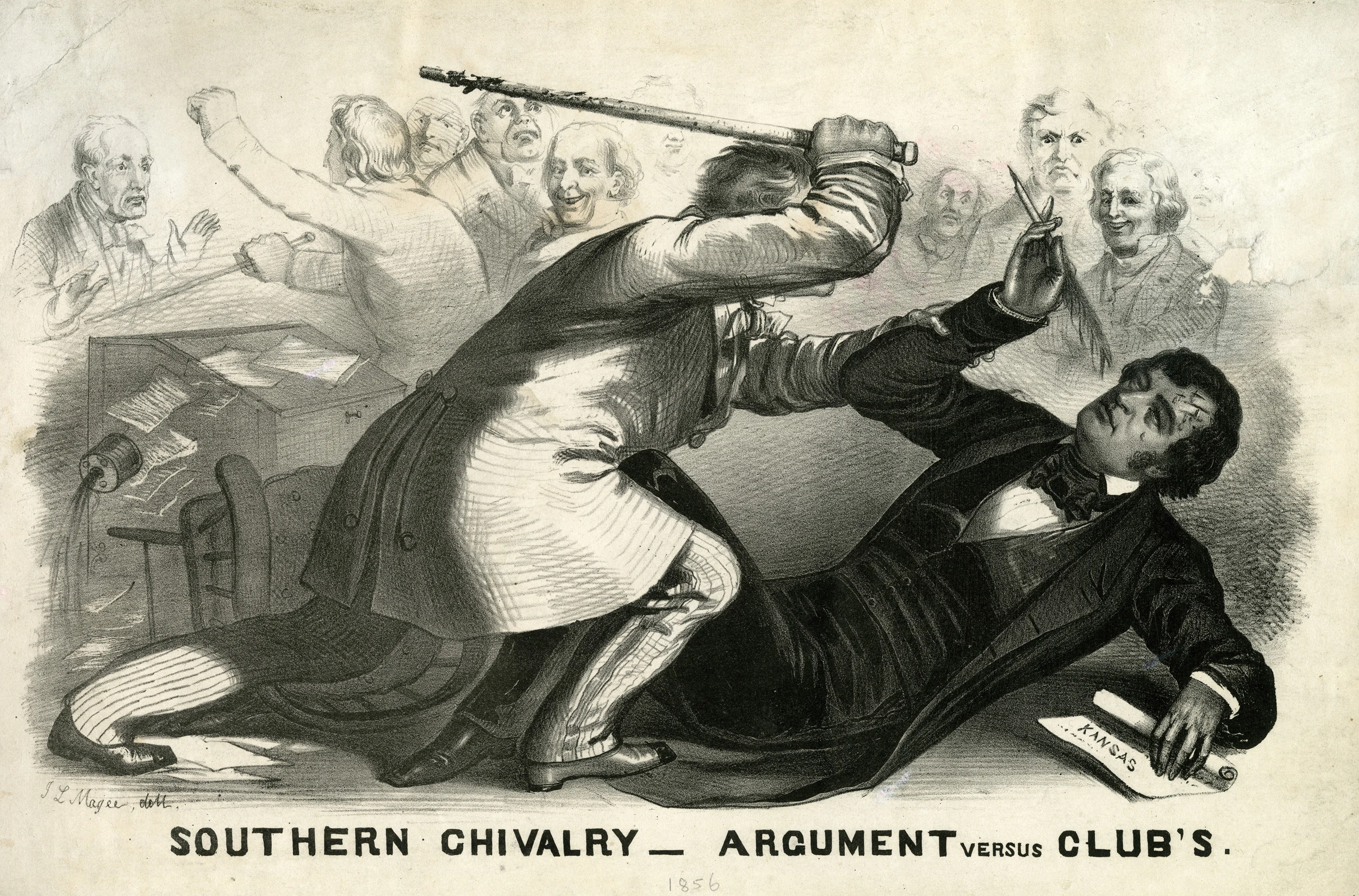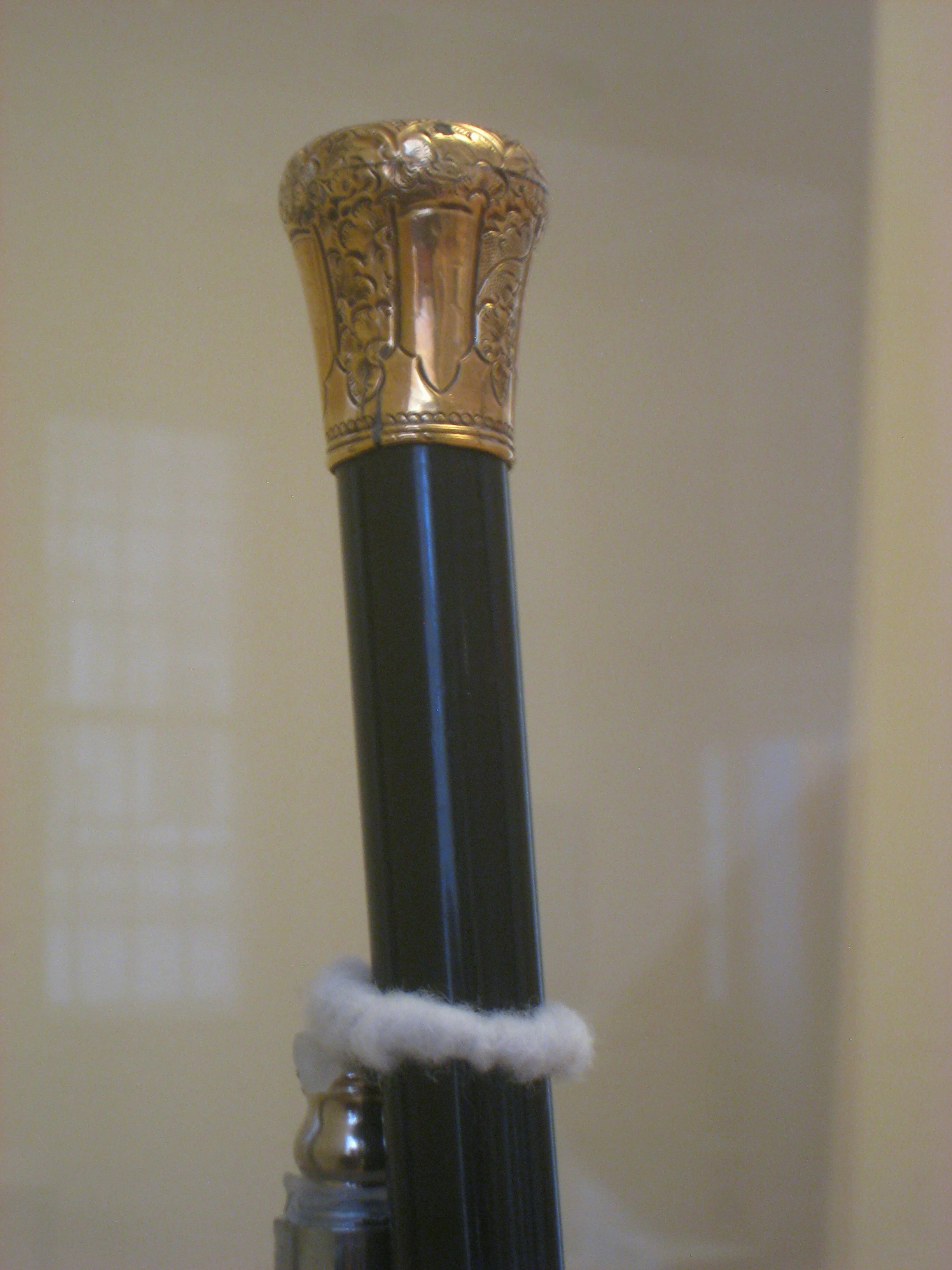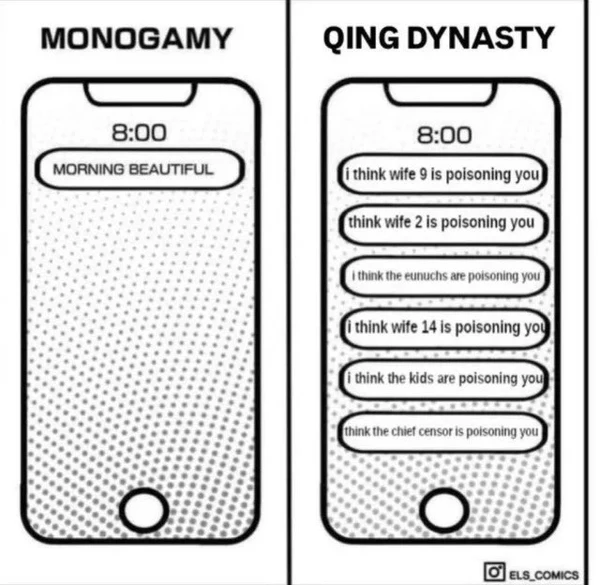The caning of Charles Sumner, or the Brooks–Sumner Affair, occurred on May 22, 1856, in the United States Senate chamber, when Representative Preston Brooks, a pro-slavery Democrat from South Carolina, used a walking cane to attack Senator Charles Sumner, an abolitionist Republican from Massachusetts. The attack was in retaliation for an invective-laden speech given by Sumner two days earlier in which he fiercely criticized slaveholders, including pro-slavery South Carolina Senator Andrew Butler, a relative of Brooks. The beating nearly killed Sumner and contributed significantly to the country's polarization over the issue of slavery. It has been considered symbolic of the "breakdown of reasoned discourse"[1] and willingness to resort to violence that eventually led to the Civil War.


In 1856, during the "Bleeding Kansas" crisis, Sumner denounced the Kansas–Nebraska Act in his "Crime against Kansas" speech, delivered on May 19 and May 20. The long speech argued for the immediate admission of Kansas as a free state and went on to denounce the "Slave Power"—the slave owners and their political power:
Not in any common lust for power did this uncommon tragedy have its origin. It is the r*pe of a virgin Territory, compelling it to the hateful embrace of slavery; and it may be clearly traced to a depraved desire for a new Slave State, hideous offspring of such a crime, in the hope of adding to the power of slavery in the National Government.[3]
Sumner's rhetoric was largely directed at the authors of the Act, Senators Stephen A. Douglas of Illinois and Andrew Butler of South Carolina. Regarding Butler, Sumner said:
The senator from South Carolina has read many books of chivalry, and believes himself a chivalrous knight with sentiments of honor and courage. Of course he has chosen a mistress to whom he has made his vows, and who, though ugly to others, is always lovely to him; though polluted in the sight of the world, is chaste in his sight—I mean the harlot, Slavery. For her, his tongue is always profuse in words. Let her be impeached in character, or any proposition made to shut her out from the extension of her wantonness, and no extravagance of manner or hardihood of assertion is then too great for this senator. The frenzy of Don Quixote, in behalf of his wench, Dulcinea del Toboso, is all surpassed.[4]
Sumner also mocked Butler's speaking ability, which had been impeded by a recent stroke:[5]
[He] touches nothing which he does not disfigure with error, sometimes of principle, sometimes of fact. He cannot open his mouth, but out there flies a blunder.[6]


Two days later, on the afternoon of May 22, 1856, Brooks entered the Senate chamber with Keitt and another ally, Representative Henry A. Edmundson of Virginia. They waited for the galleries to clear, being particularly concerned that there be no ladies present to witness what Brooks intended to do.[13] He confronted Sumner as he sat writing at his desk in the almost empty Senate chamber. "Mr. Sumner, I have read your speech twice over carefully. It is a libel on South Carolina, and Mr. Butler, who is a relative of mine", Brooks calmly announced in a low voice. As Sumner began to stand up, Brooks beat Sumner severely on the head before he could reach his feet, using a thick gutta-percha cane with a gold head. The force of the blows so shocked Sumner that he lost his sight immediately. "I no longer saw my assailant, nor any other person or object in the room. What I did afterwards was done almost unconsciously, acting under the instincts of self-defense", he recalled later
Sumner was knocked down and trapped under the heavy desk that was bolted to the floor. His chair, which was pulled up to his desk, moved back and forth on a track; Sumner either could not or did not think to slide his chair back to escape, so it pinned him under his desk. Brooks continued to strike Sumner until Sumner rose to his feet and ripped the desk from the floor in an effort to get away from Brooks.[15] By this time, Sumner was blinded by his own blood. He staggered up the aisle and, arms outstretched, vainly attempted to defend himself, but that made him an even larger and easier target for Brooks, who continued to beat him across the head, face, and shoulders "to the full extent of [my] power". Brooks did not stop when his cane snapped; he continued thrashing Sumner with the piece that held the gold head. Sumner stumbled and reeled convulsively, "Oh Lord," he gasped, "Oh! Oh!" Near the end of the attack, Sumner collapsed unconscious, although shortly before he succumbed, he "bellowed like a calf" according to Brooks. Brooks grabbed the falling Sumner, held him up by the lapel with one hand, and continued to lash out at him with the cane in the other.[16][17] Several other Senators and Representatives attempted to help Sumner, but were blocked by Edmundson, who yelled at the spectators to leave Brooks and Sumner alone,[18] and Keitt, who brandished his own cane and a pistol, and shouted, "Let them be!" and "Let them alone, God darn you, let them alone!"

Representatives Ambrose S. Murray and Edwin B. Morgan were finally able to intervene and restrain Brooks, at which point he quietly left the chamber.[23] Murray obtained the aid of a Senate page and the Sergeant at Arms, Dunning R. McNair.[24] As Sumner regained consciousness they were able to assist him to walk to a cloakroom.[25] Sumner received first aid and medical attention, including several stitches.[26] With the aid of Nathaniel P. Banks, the Speaker of the House, and Senator Henry Wilson, Sumner was able to travel by carriage to his lodgings, where he received further medical treatment.[27] Brooks also required medical attention before leaving the Capitol; he had hit himself above his right eye with one of his backswings
The cane Brooks used was broken into several pieces, which he left on the blood-soaked floor of the Senate chamber. Some, including the cane's gold head, were recovered by Edmundson, who gave the portion with the head to Adam John Glossbrenner, the House Sergeant at Arms.[29][30] This portion of the cane eventually ended up at the Old State House Museum in Boston; it was worked to smooth the edges and finish, and then put on display.[31] Southern lawmakers made rings out of the other pieces Edmundson recovered from the Senate floor, which they wore on neck chains to show their solidarity with Brooks, who boasted "[The pieces of my cane] are begged for as sacred relics."
The episode revealed the polarization in America, which had now reached the floor of the Senate. Sumner became a martyr in the North and Brooks a hero in the South. Northerners were outraged. The Cincinnati Gazette said, "The South cannot tolerate free speech anywhere, and would stifle it in Washington with the bludgeon and the bowie-knife, as they are now trying to stifle it in Kansas by massacre, rapine, and murder."

Conversely, Brooks was praised by Southern newspapers. The Richmond Enquirer editorialized that Sumner should be caned "every morning", praising the attack as "good in conception, better in execution, and best of all in consequences" and denounced "these vulgar abolitionists in the Senate" who "have been suffered to run too long without collars. They must be lashed into submission." Southerners sent Brooks hundreds of new canes in endorsement of his assault. One was inscribed "Hit him again."

Keitt was censured by the House.[57] He resigned in protest, but his constituents ratified his conduct by overwhelmingly reelecting him to his seat within a month.[58] In 1858, he attempted to choke Representative Galusha Grow of Pennsylvania (Republican) for calling him a "negro driver" during an argument on the House floor.












Jump in the discussion.
No email address required.
me in the top right
Jump in the discussion.
No email address required.
More options
Context